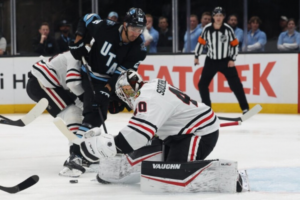Texas Rangers’ head physician Dr. Keith Meister says he has a revolutionary rule change that can improve pitcher health: outlawing two-strike foul balls.
Dr. Meister, who is part of Major League Baseball’s task force, revealed his idea as part of an extensive feature story, shared with Mike Piellucci, the sports editor of D Magazine.
This is how Piellucci interpreted the doctor’s idea:
“If he’s losing the battle, he’s refusing to concede ground. He serves on an MLB task force investigating the injury epidemic, and he has proposed a rule to ban foul balls on two-strike counts, which would amount to the most dramatic change in how the game is played in decades.
At first blush, it seems outlandish, then much less so as he bores into its potential to cut down pitch counts, push hitters to put more balls in play, and shorten games in one swoop.”
Piellucci believes that Dr. Meister’s idea would make two-strike foul balls strikeouts. This was how the league handles two-strike bunt attempts.
Based on what the doctor is proposing, removing extended at-bats would reduce pitch count and match times across the board. It would also cut down the amount of some pitch types thrown. Dr. Meister faulted “designer pitches,’’ like sweeper and hard changeup, for the increase in injuries; these pitches are often released when a K is on the line.
The MLB threw over 30% breaking balls in two-strike counts this season, in contrast to 21% in no strike counts and 24.2 in one-strike counts.
Banning two-strike fouls would significantly change the game in many ways, and as such that type of rule would not even be considered.
Furthermore, most foul balls are not caused by intent or strategy. There are some hitters who can spoil hard pitches, but they are the exception instead of the rule. It is unreasonable to think that fouls are due to intentional swings rather than just mistakes. And that rule would punish hitters. Plus there would be too many of such offenses if Meister’s rule is implemented.
On the other hand, pitchers might love the rule, not because it prevents injuries, but because it would make their jobs easier.
That is why it is not surprising to hear Dr Meister say: “I’ve even got Max Scherzer saying, ‘You know, that’s not such a bad idea.’ And Max doesn’t agree with anything.”










